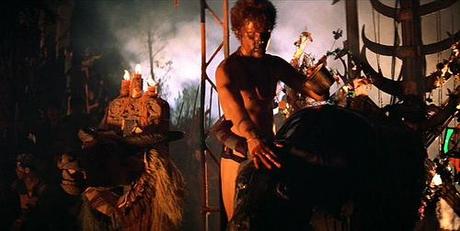The glimpse of the steamboat had for some reason filled those savages with un-restrained grief.
I researched the similarities between Heart of Darkness and Apocalypse Now, since the movie is said to be based off of the book, and I found that there is essentially two things in common. First, there is a character named Kurtz in both stories. Second, the representation of the natives was almost identical, even though they were from two different places. The natives in Apocalypse Now are exactly like Conrad described them in Heart of Darkness. However, the natives were much more savage in the movie, as you can see in the photo I've attached of them about to slaughter a cow. Other than that, the book and the movie are completely different. 